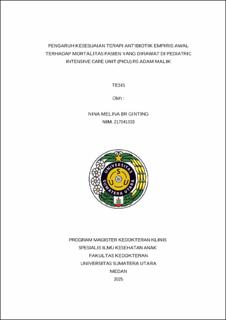Pengaruh Kesesuaian Terapi Antibiotik Empiris Awal terhadap Mortalitas Pasien yang Dirawat di Pediatric Intensive Care Unit (PICU) RS Adam Malik
Effect of Initial Empirical Antibiotic Therapy Appropriateness on Mortality of Patients in the Pediatric Intensive Care Unit (PICU) Adam Malik Hospital

Date
2025Author
Ginting, Nina Melina Br
Advisor(s)
Pasaribu, Ayodhia Pitaloka
Wijaya, Hendri
Metadata
Show full item recordAbstract
Background: The World Health Organization (WHO) estimates that every year in the world, infections caused by multidrug resistant (MDR) bacteria cause a high mortality rate. In hospitals, the incidence of MDR bacterial infections is most often found in the Pediatric Intensive Care Unit (PICU). There is only a few information on the appropriateness of empirical antibiotic therapy and its relationship with mortality in pediatric patients. This study aims to examine the relationship between the administration of empirical antibiotic therapy and mortality, especially in children treated in the PICU of Adam Malik Hospital. Methods: The study used an observational analytic and retrospective cohort approach. This study was conducted in the PICU of Adam Malik Hospital in August - October 2024. The inclusion criteria of this study were patients who were treated and received empirical antibiotic therapy in the PICU of Adam Malik Hospital in the period January-December 2023, and had positive bacterial culture results. The data obtained were secondary data in the form of mortality data, empirical antibiotic therapy, and patient demographic characteristics. The data were tested by univariate, bivariate, and multivariate analysis using statistical program. Results: The majority of patients admitted to the PICU suffered mortality (62.2%). Empirical antibiotic therapy given to the majority of patients was not in accordance with the results of bacterial culture and sensitivity tests to antibiotics (66.3%). Factors associated with mortality (p<0.05) were the appropriateness of empirical antibiotic therapy, antibiotic resistance, and duration of the hospitalization. Factors that were not associated (p>0.05) were age, gender, diagnosis of infection, comorbidities and complications, type of culture, duration of antibiotic administration, dose of antibiotic administration, interval of antibiotic administration,and type of antibiotic administration. Conclusion: The appropriateness of empirical antibiotic therapy is significantly associated with the incidence of mortality.
